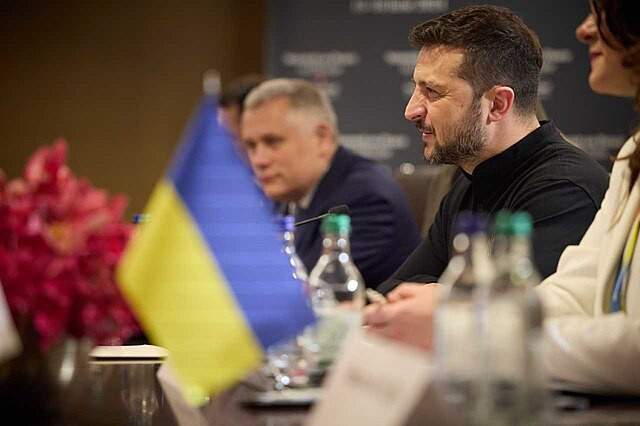President Donald Trump called on Ukraine to accept Russian President Vladimir Putin's offer for direct peace negotiations in Turkey this week, in a move that contradicts European allies' demand for a 30-day unconditional ceasefire before any talks commence.
"Ukraine should agree to this, IMMEDIATELY," Trump posted Sunday on Truth Social. "HAVE THE MEETING, NOW!!!"
Trump's comments followed a late-night address from Putin, who did not acknowledge the ceasefire ultimatum issued by European leaders on Saturday but instead proposed direct talks with Ukraine in Istanbul on Thursday. The offer marked the first such proposal since the early months of Russia's full-scale invasion in 2022.
"The decision now lies with the Ukrainian authorities," Putin said during his address. He added that a ceasefire "might" emerge from the talks, but the primary goal would be to address the "root causes" of the conflict.
Ukrainian President Volodymyr Zelensky responded cautiously, calling Putin's offer a "positive sign" but emphasizing that "the very first step in truly ending any war is a ceasefire." Ukraine reiterated its position that Moscow must first confirm a full, reliable truce before negotiations can begin.
The Kremlin's proposed summit comes amid a coordinated push from France, Germany, the UK, Poland, and Ukraine for Russia to accept a ceasefire by Monday or face increased sanctions. German Chancellor Friedrich Merz stated talks "cannot begin until weapons fall silent," while French President Emmanuel Macron said Putin's proposal was "not enough."
Trump's shift away from his earlier call for a 30-day truce, which he had supported alongside European leaders last week, has complicated Ukraine's diplomatic position. "I'm starting to doubt that Ukraine will make a deal with Putin," Trump said Sunday, effectively lifting pressure on Moscow to comply with the ceasefire demand.
Analysts suggested Putin's move was a calculated attempt to reframe the narrative. "He is putting the ball back in Kyiv's court," said Sergey Radchenko, professor at the Johns Hopkins School of Advanced International Studies. "Now, by saying, 'Look, we're offering talks and the Ukrainians are the ones who are not agreeing,' he is shifting blame."
The proposed Istanbul summit is being supported by Turkey, which confirmed its readiness to host the negotiations. Turkish President Recep Tayyip Erdogan told French President Emmanuel Macron in a Sunday call that a "historic turning point" had been reached and that a "comprehensive ceasefire would create the necessary environment for peace talks."
The White House confirmed Secretary of State Marco Rubio will be in Turkey from Wednesday to Friday for an informal NATO ministerial meeting. Kremlin spokesperson Dmitry Peskov told Russian state television that Russia was "very grateful" for Washington's mediation but warned, "it's quite useless to try to press on us."
Hostilities resumed almost immediately after the expiration of Russia's self-declared May 8-10 ceasefire, with Ukraine's Air Force reporting 108 attack drones launched overnight Sunday, 60 of which were shot down. Ukraine accused Russia of multiple violations of its own truce, and Russia claimed Ukraine had violated the ceasefire more than 14,000 times.
Zelensky reaffirmed his government's stance, stating Sunday that Ukraine expects Russia to confirm a "full, lasting, and reliable" ceasefire beginning May 12. "There is no point in continuing the killing even for a single day," he said.
Despite mounting pressure from both Moscow and Washington, Zelensky now faces what Radchenko called "huge pressure" to attend talks. "Otherwise, he'll have to deal with Trump, who's going to say, 'Why are you undermining my peace initiative here? Why can't you just talk?'"






